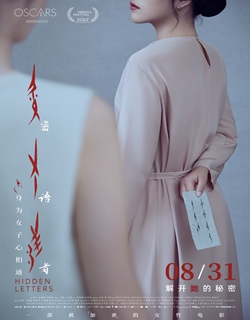Oscar-shortlisted documentary Hidden Letters, which takes the Chinese ancient language of Nüshu as its theme, started pre-screenings nationwide in China in late July.

Promotional mateial of Hidden Letters Photo: Courtesy of Elemeet
Set to be officially released on August 31, this film has already garnered attention by making it to the shortlist for the 95th Academy Awards in the Documentary Feature Film category, a remarkable feat for a Chinese production.
Hidden Letters takes place against the backdrop of Nüshu, a "secret written language" developed by and for women in Central China's Hunan Province during ancient times and recognized as the only female script in the world.
With a slender and willowy form, reminiscent of a willow leaf's grace, the script itself is as elegant as those Chinese women it represents.
The film tells the compelling stories of two contemporary Chinese women who, inspired by Nüshu, navigate social norms and traditional concepts in their quest for self-improvemen and growth.
The film's protagonists, at critical junctures in their lives, draw strength from Nüshu, striving to become the best versions of themselves.
At a recent premiere event in Beijing, Feng Du, the filmmaker behind the documentary, conveyed her artistic intent to the audience, emphasizing that women possess a distinctive viewpoint and narrative style. She aspires to bolster these unique voices with her own efforts. She elaborated on her personal journey, which became a catalyst for her creative endeavor.
In 2017, following the birth of her daughter, she faced the unexpected challenge of juggling the various roles.
This period of difficulty inspired her to explore the ancient Nüshu script. She reflected on the wisdom of women from the past who, despite facing even greater hardships, chose to forge a path of intelligence by developing the Nüshu script as a means of self-empowerment.
With this in mind, Feng aimed to merge the legacy of Nüshu with the narratives of contemporary women. Her goal was not solely to create a documentary but to ensure the script's continued relevance and to discover common solutions within the experiences of modern women.
After being shortlisted for the Oscars, Hidden Letters has been screened in various cities worldwide, to wide acclaim. Feng told the Global Times that she found it was very interesting that even in North Europe, female audience members would approach her after each screening to celebrate the work.
"This is the significance of Nüshu in today's world - it shines like a beacon within us, transcending geographical boundaries," she said.
Nüshu was rediscovered in the 1950s in Jiangyong county, Hunan Province. Named "Jiangyong Nüshu," it was listed among the first batch of national intangible cultural heritages of China in 2006.
The documentary skillfully intertwines the revival of this intangible cultural heritage with the protagonists' stories. From initially limited promotional methods to the diverse cultural and creative forms of Nüshu displayed later, the film has won the hearts of a wide audience.
Hu Xin, a Nüshu inheritor, encapsulates the spirit and significance of the written language with the word "calm."
"Facing anything with a composed and serene attitude is true strength. As an inheritor of Nüshu, through my efforts, I hope to make more people understand and recognize Nüshu," she told the Global Times.
The film Hidden Letters is not just a documentary; it is a testament to the enduring strength and resilience of women, a story that resonates across cultures and times, and a beacon of inspiration for the contemporary journey of growth. Just as Hu stated in the film, "When I'm strong, Nüshu is revived."




